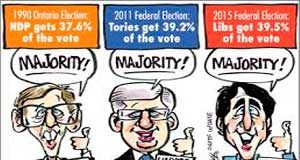The federal government’s electoral change (reform) website is being widely mocked. But beneath the outrage and humour, what’s really wrong with mydemocracy.ca?
Plenty.

Take part in the national conversation on electoral reform (change).
The website is intended to gather perspectives from Canadians who wish to “take part in the national conversation on electoral reform,” according to postcards sent to millions of homes. But the initial perspectives are all about the website and the methodology it represents:
1) It’s possible to submit multiple times, so whomever has the most free time, can hire the biggest online army or has access to hackers could tilt the results. With the data in doubt, any claim the Liberal government makes is suspect. And anyone who doesn’t like the outcome could cry foul.
Clifton van der Linden, the CEO of Vox Pop Labs (the firm that made the website), claims they can detect duplicate submissions with “IP addresses and using cookies.” That’s enough to stop a naïve attacker. But it won’t stop a mid-level hacker who can write a script that simply removes the cookies and uses lots of IP addresses via a botnet.
Electoral change
2) The site contains no questions about voter equality or proportionality of results. This is a stunning omission in a survey that is supposed to be about electoral reform values. Voter equality and proportionality are the core values for many people.
3) The survey is filled with questions that add a negative twist. Take one and turn it around. For example, “It is better for several parties to have to govern together than for one party to make all the decisions in government, even if it takes longer for government to get things done.”
They could have asked: “It is better for one party to make all the decisions in government, even if the resulting decisions often result in worse policy.”
Both questions ask about coalition versus majority governments but which version would you ask if you hope Canadians will support majority governments?
4) The site has too many ambiguous questions. For example, “Voters should be able to express multiple preferences on the ballot, even if this means that it takes longer to count the ballots and announce the election result.” How do people answer if they want multiple preferences and quick results? That’s achievable with an investment in technology.
Psychologists and sociologists, who construct surveys all the time, have strict guidelines such as “Whenever possible, statements should be in simple sentences rather than complex or compound sentences. Avoid statements that contain ‘if’ or ‘because’ clauses.” Twelve of the first 20 questions break this guideline.
5) Several questions assume that an MP’s constituents are all the same. For example, do you prefer “members of Parliament that (sic) do what their party promised, even if it means going against what their constituents want or members of Parliament that do what their constituents want, even if it means going against what their party promised?”
But this situation never occurs! There are always some constituents who want what the party promised and there are always some who don’t. One of the main points of proportional representation is that a single MP cannot represent the viewpoints of all their constituents. The survey could have asked: “Should people have a choice of which elected MP they approach with a specific concern?”
6) Finally, if you group the first 30 questions by common theme, you quickly find the values that concern the Liberal Party: coalition governments (six questions), MP loyalty to their party (four), diversity (four), online voting (four) and simple ballots (three). There are also two questions that deal with parties and diversity, and a mishmash of questions on voting age, obligatory voting and so on (seven questions).
These are not the values of primary concern in the electoral change (reform) debate. They could have asked about making every vote count and whether the proportion of votes for a party should equal the proportion of MPs in Parliament. They could have asked whether the vast majority of voters should have an MP who represents their viewpoint and the importance of having a local MP.
Instead, they asked leading questions guaranteed to generate responses all over the map. And then the government can claim there is no consensus and break their promise to make every vote count.
Followed by yet more mocking and outrage.
— Byron Weber Becker teaches computer science at the University of Waterloo. He testified to the Special Committee on Electoral Reform and was asked to do additional work for them as a follow-up to his testimony.
 TheBulletin.ca Journal of Downtown Toronto
TheBulletin.ca Journal of Downtown Toronto


In other words, Our electoral system (here and on every level) is captured by powerful, uncaring, anti-democratic, special interests.